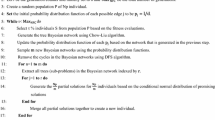Abstract
Recently, estimation of distribution algorithms (EDAs) have gradually attracted a lot of attention and have emerged as a prominent alternative to traditional evolutionary algorithms. In this paper, a block-based EDA using bivariate model is developed to solve combinatorial problems. Instead of generating a set of chromosomes, our approach generates a set of promising blocks using bivariate model and these blocks are reserved in an archive for future use. These blocks will be updated every other k generation. Then, two rules, i.e., AC1 and AC2, are developed to generate a new chromosome by combining the set of selected blocks and rest of genes. This block based approach is very efficient and effective when compared with the traditional EDAs. According to the experimental results, the block based EDA outperforms EDA, GA, ACO and other evolutionary approaches in solving benchmark permutation problems. The block based approach is a new concept and has a very promising result for other applications.














Similar content being viewed by others
References
Ahmadizar F (2012) A new ant colony algorithm for makespan minimization in permutation flow shops. Comput Ind Eng 63(2):355–361
Bagchi TP (1999) Multiobjective Scheduling by Genetic Algorithms. Kluwer, Boston
Baker KR (1974) Introduction to sequencing and scheduling. Wiley, New York
Baker KR (1975) A comparative study of flow-shop algorithms. Oper Res 23(1):62–73
Baluja S (1994) Population based incremental learning: a method for integrating genetic search based function optimization and competitive learning. Technical Report No. CMU-CS-94-163, Carnegie Mellon University, Pittsburgh, Pennsylvania, USA
Ceberio J, Irurozki E, Mendiburu A, Lozano J (2012) A review on estimation of distribution algorithms in permutation-based combinatorial optimization problems. Prog Artif Intell 1(1):103–117
Chang PC, Chen SH, Fan CY (2008a) Mining gene structures to inject artificial chromosomes for genetic algorithm in single machine scheduling problems. Appl Soft Comput J 8(1):767–777
Chang PC, Chen SH, Fan CY, Chan CL (2008b) Genetic algorithm integrated with artificial chromosomes for multi-objective flow-shop scheduling problems. Appl Math Comput 205(2):550–561
Chang PC, Huang WH, Ting CJ (2010) Self-evolving Artificial Immune System via Developing T and B Cell for Permutation Flow-shop Scheduling Problems. Proceedings of World Academy of Science, Engineering and Technology 65:822–827
Chang PC, Huang WH, Ting CJ (2011) A hybrid genetic-immune algorithm with improved lifespan and elite antigen for flow-shop scheduling problems. Int J Prod Res 49(17):5207–5230
Chen SH, Chen MC (2013) Addressing the advantages of using ensemble probabilistic models in estimation of distribution algorithms for scheduling problems. Int J Prod Econ 141(1):24–33
Chen YM, Chen MC, Chang PC, Chen SH (2012) Extended artificial chromosome genetic algorithm for permutation flowshop scheduling problems. Comput Ind Eng 62(2):536–545
Costa WE, Goldbarg MC, Goldbarg EG (2012) New VNS heuristic for total owtime owshop scheduling problem. Expert Syst Appl 39(9):8149–8161
Dong X, Chen P, Huang HK, Nowak M (2013) A multi-restart iterated local search algorithm for the permutation flow-shop problem minimizing total flow time. Comput Oper Res 40(2):627–632
Garey MR, Johnson DS (1979) Computers and Intractibility: a Guide to the Theory of NP-Completeness. Freeman, San Francisco
Harik GR, Lobo FG, Goldberg DE (1999) The compact genetic algorithm. IEEE Trans Evolut Comput 3(4):523–528
Larrañaga PJ, Lozano A (2002) Estimation of distribution algorithms: A new tool for evolutionary computation. Kluwer Academic Publishers, Boston
Lian Z, Gu X, Jiao B (2006) A similar particle swarm optimization algorithm for permutation flow-shop scheduling to minimize makespan. Appl Math Comput 175(1):773–785
Liu HC, Gao L, Pan QK (2011) A hybrid particle swarm optimization with estimation of distribution algorithm for solving permutation flow-shop scheduling problem. Expert Syst Appl 38(4):4348–4360l
Paul TK, Iba H (2002) Linear and Combinatorial Optimizations by Estimation of Distribution Algorithms. 9th MPS Symposium on Evolutionary Computation, IPSJ Symposium, Japan, pp 99–106
Pen QK, Ruiz R (2012) Local search methods for the flow-shop scheduling problem with flowtime minimization. Eur J Oper Res 222(1):31–43
Reeves CR (1995) A genetic algorithm for flow-shop sequencing. Comput Oper Res 22(1):5–13
Tasgetiren MF, Pan QK, Suganthan PN, Chen AH (2011) A discrete artificial bee colony algorithm for the total flowtime minimization in permutation flow-shops. Inf Sci 181(1):3459–3475
Tsutsui S (2002) Probabilistic model-building genetic algorithms in permutation representation domain using edge histogram. Lect Notes Comput Sci 2439:224–233
Tsutsui S, Pelikan M, Goldberg DE (2006) Node Histogram vs. Edge Histogram: a Comparison of PMBGAs in Permutation Domains. Missouri Estimation of Distribution Algorithms Laboratory, MEDAL Report No. 2006009, July
Tzeng YR, Chen CL, Chen CL (2012) A hybrid EDA with ACS for solving permutation flow-shop scheduling. Int J Adv Manuf Technol 60:1139–1147
Zhang Q (2004) On Stability of fixed points of limit models of univariate marginal distribution algorithm and factorized distribution algorithm. IEEE Trans Evol Comput 8(1):80–93
Author information
Authors and Affiliations
Corresponding author
Additional information
Communicated by Y. Jin.
Rights and permissions
About this article
Cite this article
Chang, PC., Chen, MH. A block based estimation of distribution algorithm using bivariate model for scheduling problems. Soft Comput 18, 1177–1188 (2014). https://doi.org/10.1007/s00500-013-1136-1
Published:
Issue Date:
DOI: https://doi.org/10.1007/s00500-013-1136-1




